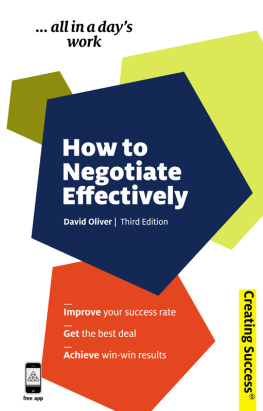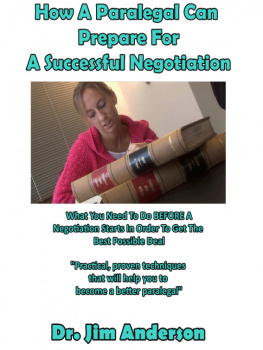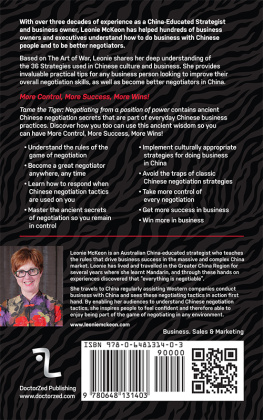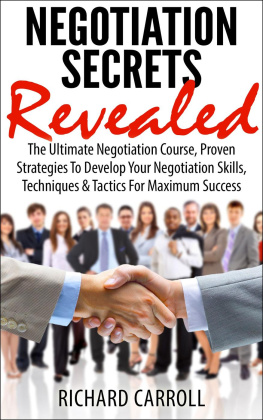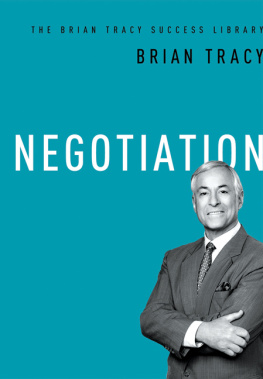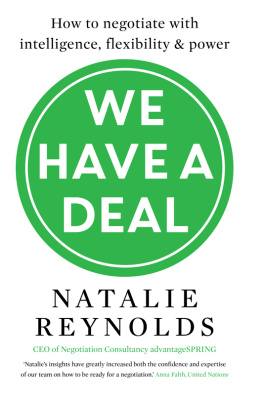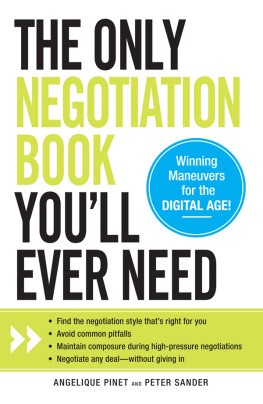How to
Negotiate
Effectively
David Oliver | Third Edition

Publishers note
Every possible effort has been made to ensure that the information contained in this book is accurate at the time of going to press, and the publishers and author cannot accept responsibility for any errors or omissions, however caused. No responsibility for loss or damage occasioned to any person acting, or refraining from action, as a result of the material in this publication can be accepted by the editor, the publisher or the author.
Parts of this book were previously published as 101 Ways to Negotiate More Effectively , also published by Kogan Page.
First published as How to Negotiate Effectively in 2003
Reprinted 2004, 2005
Second edition 2006
Reprinted 2007, 2008
Third edition 2011
Apart from any fair dealing for the purposes of research or private study, or criticism or review, as permitted under the Copyright, Designs and Patents Act 1988, this publication may only be reproduced, stored or transmitted, in any form or by any means, with the prior permission in writing of the publishers, or in the case of reprographic reproduction in accordance with the terms and licences issued by the CLA. Enquiries concerning reproduction outside these terms should be sent to the publishers at the undermentioned addresses:
120 Pentonville Road London N 1 9 JN United Kingdom www.koganpage.com | 525 South 4th Street, #241 Philadelphia PA 19147 USA | 4737/23 Ansari Road Daryaganj New Delhi 110002 India |
David Oliver, 2003, 2006, 2011
The right of David Oliver to be identified as the author of this work has been asserted by him in accordance with the Copyright, Designs and Patents Act 1988.
ISBN 978 0 7494 6170 6
E-ISBN 978 0 7494 6135 5
British Library Cataloguing in Publication Data
A CIP record for this book is available from the British Library.
Library of Congress Cataloging-in-Publication Data
Oliver, David, 1951-
How to negotiate effectively / David Oliver. -- 3rd ed.
p. cm.
ISBN 978-0-7494-6170-6 -- ISBN 978-0-7494-6135-5 (ebk) 1. Negotiation in businesss. 2. Negotiation. I. Title.
HD58.6.O38 2011
658.4052--dc22
2010018064
Typeset by Jean Cussons Typesetting, Diss, Norfolk
Printed and bound in India by Replika Press Pvt Ltd
eBook by Graphicraft Ltd, Hong Kong
This book is dedicated to my dad, who taught me my first steps in negotiation. He taught me the work ethic and showed me by example how to love hard work.
Contents
This book is for you!
If you are in buying or selling, a business owner or manager, this book is likely to dramatically change your world and your results. Everyone in business invariably both buys and sells. Most business owners, managers and partners buy and sell in different ways every week, sometimes every day. This book is for you, to help you get the best out of every deal, whether its a one-off deal or a long-term relationship. It is also for the professional salesman or buyer.
Each of these keys for better negotiation has been specifically written so that it has application for selling and buying. Apply the principles in this book and you should quite easily see an improvement in your net profit of at least 10 per cent. No, Im not exaggerating, so please dont switch off! Just one idea alone has saved me 10,000 on the purchase of our family boat.
In fact, in 20 years of teaching this material, no one I know has ever lost money as a result of its application. But hundreds of people that I have heard from have taken one or more of these keys and achieved better deals time and time again.
The material in this book is useful in every sphere of life work and family. For example one of our kids works as a trainee paramedic. She has to negotiate with difficult patients and the ambulance dispatcher from the control centre.
Husbands and wives often unwittingly negotiate. Families negotiate in relationships and in the parentchildren roles especially in the teenage years. Our youngest daughter is in the middle of buying her first starter home and that is a huge negotiation at a young age.
Very few business people negotiate effectively, and the rewards for those who do are great. Follow these principles and above-average performance will follow. A 10 per cent improvement is well within your grasp, so read on!
One trend today in modern business practice is based around partnerships between suppliers and customers. To enjoy a long-term relationship, both buyer and seller must reach mutual agreement about the business being transacted not just price but a whole range of terms, conditions and other related ingredients. To do that, they negotiate. The skill of the negotiators will determine whether that relationship succeeds or fails. The greater your skill, the greater the advantage you can expect.
The bulk of examples and anecdotes in this book are from a business setting. The principles underpinning them however are transferable into family and workplace relationships.
Many of you reading this book will have ideas or examples of your own. I would love to hear from you. Why not write to me at Kogan Page maybe I can use your anecdote in the next edition!
There are many misconceptions about negotiation. Estate agents like to call themselves negotiators, yet in house sales they rarely do anything, except discount the price of the property. Many salespeople describe themselves as negotiators. So what is it? Is it a Dutch auction, which starts high and goes lower? Is it another word for selling? These are very common misconceptions. In fact, negotiation is none of these. A simple dictionary definition describes negotiation as discussing or bargaining in order to reach agreement.
Negotiation is a transaction in which both parties have a veto on the final outcome. It requires voluntary consent on both sides. It is a give and take process where the actual conditions of a transaction are agreed. It is the act or process of bargaining to reach a mutually acceptable agreement or objective. It requires movement on both sides real or perceived.
Why do we negotiate? Simply because if we dont we will not get the best deals available to us. One thing I can promise you is: if you dont negotiate, you are already losing money or missing out on the best outcome . The reality is, of course, that lots of people in business do not negotiate they simply make agreements the best they can and it costs them every single time. A senior manager from one of the worlds leading software companies called me and said this: Reading your material, I realised that our team of sellers never negotiate, they just close the deal. We are losing large sums of money every month just because no one has taught us a better way. Can you come and help us?
In a free market economy there are only two pivots around which any deal will finally be agreed: price and value. The bulk of people in business concentrate just on price wrongly. Focus just on price and the best deals will never come your way.
Negotiation is in some ways like chess. You are prepared to sacrifice particular pieces in the interests of winning the game. In chess you know the pieces but you cant see into the other persons mind. In negotiation you dont necessarily know the pieces. You have to discover and develop your own pieces and find ways of uncovering your counterparts.

